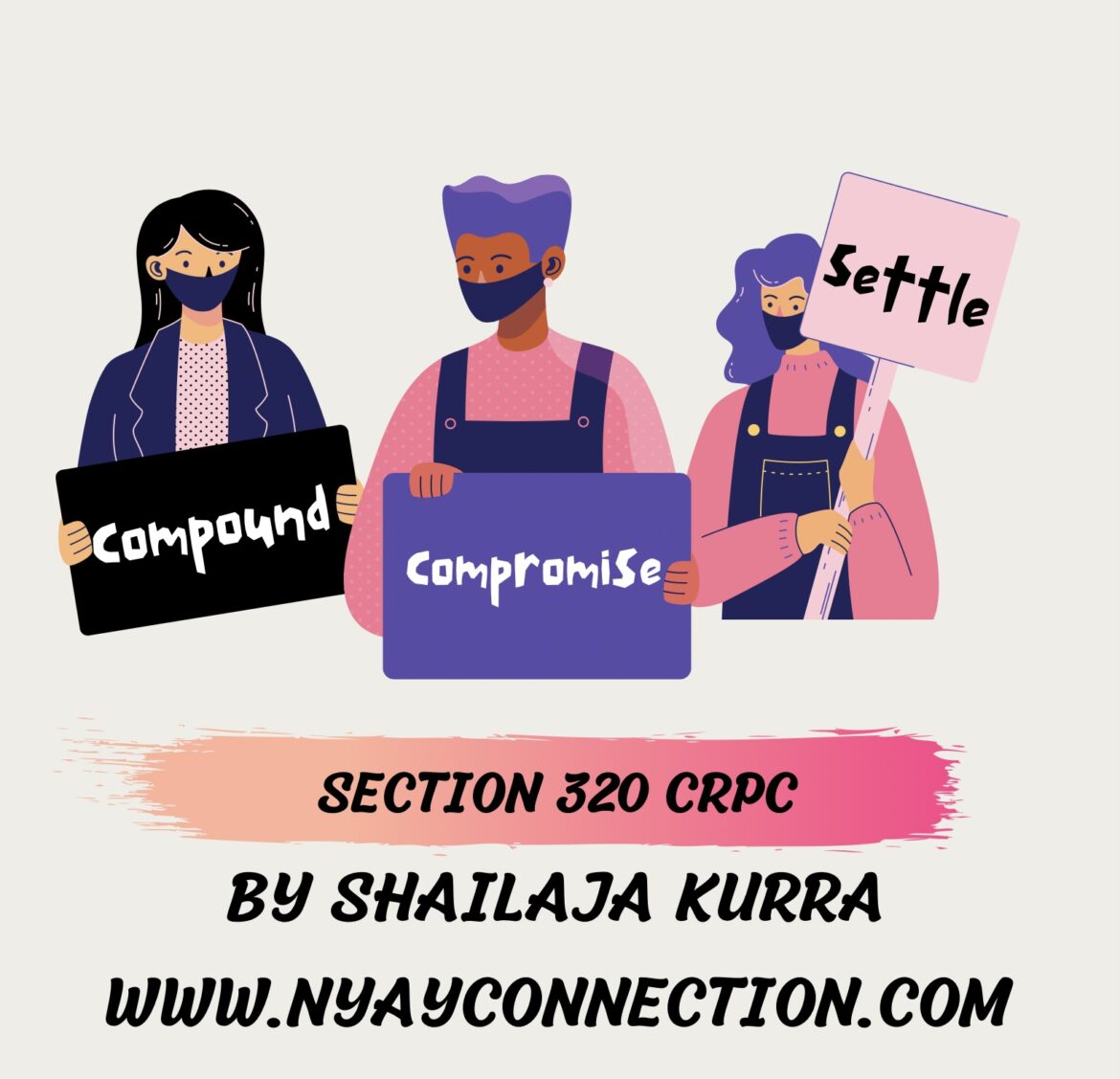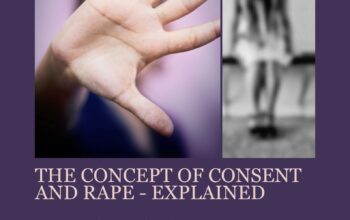Compounding of offences under Section 320 of the Code of Criminal Procedure (CrPC) means that the victim or the legal heirs of the victim can agree to drop the charges against the accused in exchange for some form of compensation or other conditions.
The offences that are compoundable with the permission of the court include more serious offences, such as those punishable with imprisonment for a term not exceeding three years or those under the Indian Penal Code (IPC) relating to marriage, such as cruelty by husband or his relatives, and desertion by husband or wife.
In order to compound an offence under Section 320 of the CrPC, the victim or the aggrieved must file an application before the court requesting the compounding of the offence. The accused must also give his or her consent to the compounding of the offence. The court may refuse permission for compounding on certain grounds, such as the seriousness of the offence or the public interest involved.
If the court grants permission for compounding of the offence, the victim or legal heirs and the accused will enter into an agreement which will be filed before the court. Once the agreement is accepted by the court, the case will be closed, and the accused will be discharged.
Section 320(1) of the Code of Criminal Procedure (CrPC) is related to the compounding of certain offences. It states that certain specified offences under the Indian Penal Code (IPC) can be compounded by the victim or the legal heirs of the victim when the victim has expired.
The offences that are compoundable with the permission of the court under section 320(1) include:
Uttering words, etc., with deliberate intent to wound the religious feelings of any person (Section 298), Voluntarily causing hurt (Section 323), Voluntarily causing hurt on provocation (Section 334), Voluntarily causing grievous hurt on grave and sudden provocation (Section 335), Wrongfully restraining or confining any person (Section 341, 342), Criminal intimidation (Section 506), Wrongfully confining a person for three days or more (Section 343), Wrongfully confining a person for ten days or more (Section 344), Wrongfully confining a person in secret (Section 346), Assault or use of criminal force (Section 352,355,358), Theft (Section 379), Dishonest misappropriation of property (Section 403), Criminal breach of trust by a carrier, wharfinger, etc (Section 407), Dishonestly receiving stolen property knowing it to be stolen (Section 411), Assisting in the concealment or disposal of stolen property, knowing it to be stolen (Section 414), Cheating (Section 417), Cheating by personation (Section 419), Fraudulent removal or concealment of property, etc., to prevent distribution among creditors (Section 421), Fraudulent removal or concealment of property, etc., to prevent distribution among creditors (Section 422), Fraudulent execution of deed of transfer containing false statement of consideration (Section 423), Fraudulent removal or concealment of property (Section 424), Mischief, when the only loss or damage caused is loss or damage to a private person (Section 426,427), Mischief by killing or maiming animal (Section 428), Mischief by killing or maiming cattle, etc (Section 429), Mischief by injury to works of irrigation by wrongfully diverting water when the only loss or damage caused is loss or damage to private person (Section 430), Criminal trespass (Section 447) , House Trespass (Section 448), House-trespass to commit an offence (other than theft) punishable with imprisonment (Section 451), Using a false trade or property mark (Section 482), Counterfeiting a trade or property mark used by another (Section 483), Knowingly selling, or exposing or possessing for sale or for manufacturing purpose, goods marked with a counterfeit property mark (Section 486), Criminal breach of contract of service (Section 491), Adultery (Section 497), Enticing or taking away or detaining with criminal intent a married woman (Section 498), Defamation (Section 500), Printing or engraving matter (Section 501), Sale of printed or engraved substance containing defamatory matter, knowing it to contain such matter (Section 502), Insult intended to provoke a breach of the peace (Section 504), Inducing person to believe himself an object of divine displeasure (Section 508).
Section 320(2) of the Criminal Procedure Code (CrPC) pertains to compoundable offenses under the Indian Penal Code (IPC) which can be compounded by the victim with the permission of the court. Compoundable offenses are those offenses that can be settled outside the court by way of compromise between the parties involved.
As per Section 320(2) of the CrPC, the following offences under the IPC are compoundable with the permission of the court:
Causing miscarriage (Section 312), Voluntarily causing grievous hurt (Section 325), Causing hurt by doing an act so rashly and negligently as to the safety of others (Section 337), Causing grievous hurt by doing an act so rashly and negligently as to endanger human life or the personal safety of others (Section 338), Assault or criminal force in attempting wrongfully to confine a person (Section 357), Theft, by clerk or servant of property in possession of master (Section 381), Criminal breach of trust (Section 406), Criminal breach of trust by a clerk or servant (Section 408), Cheating a person whose interest the offender was bound, either by law or by legal contract, to protect (Section 418), Cheating and dishonestly inducing delivery of property or the making, alteration or destruction of a valuable security (Section 420), Marrying again during the lifetime of a husband or wife (Section 494), Defamation against the President or the Vice-President or the Governor of a State or the Administrator of a Union territory or a Minister in respect of his public functions when instituted upon a complaint made by the Public Prosecutor (Section 500), Uttering words or sounds or making gestures or exhibiting any object intending to insult the modesty of a woman or intruding upon the privacy of a woman (Section 509).
Section 320(3) of the Criminal Procedure Code (CrPC) – If an offence is compoundable in nature, i.e., one stated in this section, the aiding and abetting of such an offence or attempting to commit such an offence is similarly compoundable in nature. In other words, if a person attempted to commit a compoundable offence or aided in the execution of a compoundable offence, the abetment or attempt is equally compoundable. Yet, this is only true for those offenses for which abetment and attempt are offenses in and of themselves.
Section 320(4) of the Criminal Procedure Code (CrPC) – Where the victim is a minor/ insane or dead. This provision proposes that where a victim is minor (under the age of 18) or a lunatic, a guardian representing such a minor or lunatic can compound the offence on their behalf. however, this may only be done with the court’s permission. As a result, before a guardian may compound an offense on behalf of a minor, the court must grant permission. Subsection 4 specifies that if the individual who had the authority to compound the offence is dead, a legal representative of that person may compound the charge on his or her behalf if the court grants prior permission.
Section 320(5) of the Criminal Procedure Code (CrPC) – states that when the accused is on trial for a compoundable offense or when the accused has been convicted by a court and an appeal against the conviction is pending, compounding is not permitted at that stage without the permission of the court where the accused is on trial and the court where the appeal is pending.
Section 320(6) of the Criminal Procedure Code (CrPC) – The High Court, under section 401 of the CrPC, and the Sessions Court, under section 399 of the CrPC, grant permission to compound offenses if the individual requesting permission is competent to do so. Sections 401 and 399 of the CrPC talk about the High Court’s and Sessions Court’s respective revisionary powers. The phrase “revisionary power” refers to the fact that in some situations, an appeal to a higher court against a lower court’s order of conviction is not permitted. In such circumstances, justice is not always administered correctly, and the person convicted cannot even appeal since the power to appeal is limited. Under this section, the high court functions as an appeals court, determining if there has been any injustice in terms of jurisdiction, issues of law, abuse of authority by the lower court, and so on.
Section 320(7) of the Criminal Procedure Code (CrPC) – No offence shall be compounded if the accused is already subject to a higher or different penalty for a previous conviction for the same offence.
Section 320(8) of the Criminal Procedure Code (CrPC) – The result of compounding an offense is that the offender is acquitted. It makes no difference whether the FIR was filed or whether the trial had begun; as long as the offence was compounded with the court’s authorization, the offender is free of all accusations.
This article is written by Shailaja Kurra. Shailaja is a 4th year law student from Padala Rama Reddi Law College, Hyderabad. For feedback relating to this article, she may be reached at shailajakurra3120@gmail.com.
If you are also a law student or legal professional and wish to contribute to the website, you may send your submission at nyayconnection@gmail.com.




